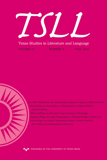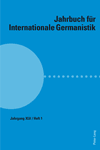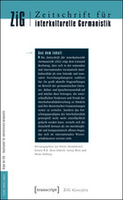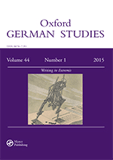
ZEITSCHRIFT FUR DEUTSCHE PHILOLOGIE
metrics 2024
Illuminating the Complexities of Language and Literature
Introduction
ZEITSCHRIFT FUR DEUTSCHE PHILOLOGIE is a prestigious academic journal dedicated to the exploration of German philology, literature, and linguistic theory, published by Erich Schmidt Verlag. With a commitment to advancing scholarship in the field, it showcases a diverse range of research articles, critical essays, and theoretical explorations that contribute to the understanding of German language and its literary heritage. While the journal has experienced fluctuating coverage in indexing databases such as Scopus, it remains a valuable resource for researchers and students alike, offering insights into relevant academic discourse. Despite not being openly accessible, the journal continues to serve as an important platform for academic exchange and innovation, allowing scholars to engage with the complexities of language and literature. Its rigorous peer-review process ensures that only high-quality research is published, making it essential reading for anyone invested in the humanities.
Metrics 2024
 -
- 0.10
0.10 0.10
0.10 -
-Metrics History
Rank 2024
Scopus
JCI (Web Of Science)
Quartile History
Similar Journals

Revista de Filologia Alemana
Exploring the Depths of German PhilologyRevista de Filologia Alemana, published by Universidad Complutense de Madrid, serves as a vital platform for scholarly dialogue in the fields of Linguistics and Literature. With its origins dating back to 1996, this peer-reviewed journal provides insights and critical analyses that foster a deeper understanding of German philology and its broader implications. Although categorized in Q4 across both Linguistics and Literary Theory as of 2023, the journal represents a growing contribution to academic discourse, aiming to enhance knowledge and promote research within these domains. Although it does not currently offer open access, the journal continues to attract submissions from both established scholars and emerging researchers, thereby ensuring a diverse range of perspectives. With Scopus rankings highlighting its position within the academic landscape, Revista de Filologia Alemana is essential for anyone looking to delve into the intricate relationships between language and literature.

Dicenda-Cuadernos de Filologia Hispanica
Illuminating Contemporary and Historical PerspectivesDicenda-Cuadernos de Filologia Hispanica, published by UNIV COMPLUTENSE MADRID, SERVICIO PUBLICACIONES, is a distinguished academic journal in the fields of linguistics, literature, and literary theory. Since its transition to Open Access in 2017, it has facilitated unrestricted dissemination of knowledge, making it an invaluable resource for researchers, scholars, and students interested in the rich tapestry of Hispanic philology. With an impact factor reflected by its Scopus rankings—at Q3 in Linguistics and Language and Q2 in Literature and Literary Theory—Dicenda serves as a vital platform for innovative research and critical discourse. The journal actively encourages submissions that explore contemporary and historical perspectives within its scope. Located in Madrid, Spain, the journal has steadily established itself as a significant contributor to the ongoing dialogue in the humanities, fostering a deeper understanding of linguistic and literary phenomena.

Nueva Revista Filologia Hispanica
Fostering Insightful Dialogues in LinguisticsNueva Revista Filologia Hispánica, published by COLEGIO MEXICO, A C, DEPT PUBLICACIONES, has been a pivotal resource in the field of Hispanic philology since its establishment in 1966, transitioning to an open-access model that enhances the accessibility of scholarly works in the area. With an ISSN of 0185-0121 and an E-ISSN of 2448-6558, the journal is housed in Mexico City and aims to publish innovative research that contributes to the understanding of the linguistic and cultural dynamics of the Spanish language. It consistently ranks in the Q3 category of Linguistics and Language for 2023, reflecting its commitment to academic excellence as demonstrated by its Scopus ranking in both Arts and Humanities and Social Sciences. With converged years from 2011 to 2024, the journal encourages contributions that inspire further discourse among researchers, professionals, and students, thus solidifying its importance as a scholarly platform in the linguistics landscape.

LINKS Rivista di letteratura e cultura tedesca
Advancing Scholarly Dialogues in German StudiesLINKS Rivista di letteratura e cultura tedesca is a distinguished academic journal dedicated to the exploration and analysis of German literature and culture. Published by FABRIZIO SERRA EDITORE, this journal serves as a vital platform for researchers, professionals, and students who wish to delve into the intricacies of German cultural studies across various time periods and genres. With both ISSN 1594-5359 and E-ISSN 1724-1685, LINKS emphasizes scholarly rigor and multidisciplinary approaches, providing a space for innovative research and critical perspectives. Although the journal is not open access, it still plays a crucial role in advancing the understanding of German literature within the international academic community, contributing significantly to the field's ongoing dialogue and evolution. For those interested in enhancing their knowledge and engagement with contemporary issues in German studies, LINKS represents an essential resource.

TEXAS STUDIES IN LITERATURE AND LANGUAGE
Fostering Dialogue in Texas Literature and LinguisticsTEXAS STUDIES IN LITERATURE AND LANGUAGE, published by University of Texas Press, is a distinguished scholarly journal dedicated to the exploration of the rich tapestry of literature and language from Texas and its encompassing regions. With its ISSN 0040-4691 and E-ISSN 1534-7303, this journal serves as a vital platform for researchers, educators, and students interested in the intersection of cultural studies, literary analysis, and linguistic inquiry. Despite the absence of Open Access, the journal remains an essential resource for those seeking rigorous academic discourse within the humanities. The journal, established in 1974, has published influential articles that contribute to a deeper understanding of Texas's unique literary heritage, making it a beacon of scholarship in American literature. The impact factor reflects its relevance and engagement in ongoing literary dialogues. We invite scholars and students alike to engage with the rich content provided, ensuring that Texas's literary legacy continues to be studied and celebrated.

JAHRBUCH FUR INTERNATIONALE GERMANISTIK
Fostering Critical Discourse in German Language and CultureJAHRBUCH FUR INTERNATIONALE GERMANISTIK is a prominent academic journal published by VERLAG PETER LANG AG, dedicated to advancing research in the fields of German studies, literature, and linguistics. With its ISSN 0449-5233 and E-ISSN 2235-1280, this journal provides a platform for scholarly discourse, critical analysis, and innovative studies related to German language and literary theory. Although its coverage in Scopus was discontinued in 2014, the journal continues to be influential within the academic community, evidenced by its rankings in the Arts and Humanities and Social Sciences categories. Specifically, it holds a rank of #397 in Literature and Literary Theory and #477 in Language and Linguistics, reflecting a solid presence among peers. Researchers and students alike can benefit from its insightful articles that delve into various dimensions of Germanistik, thereby fostering a greater understanding of language and cultural contexts. For those interested in contributing to this field of study, JAHRBUCH FUR INTERNATIONALE GERMANISTIK serves as an essential resource for high-quality scholarly content.

Acta Germanica-German studies in Africa
Charting New Territories in German StudiesActa Germanica - German Studies in Africa is a pivotal academic journal dedicated to the exploration and dissemination of scholarly research in the field of German studies, particularly within the African context. Published by PETER LANG GMBH, a renowned publisher recognized for its commitment to high-quality academic works, this journal serves as an essential platform for researchers, students, and professionals interested in the cultural, historical, and linguistic dimensions of German influences and exchanges in Africa. While the journal currently does not provide open access, it maintains rigorous standards of peer review, ensuring the integrity and academic contribution of its publications. With an ISSN of 0065-1273, Acta Germanica invites contributions that broaden the understanding of the interplay between German and African societies, enhancing the discourse in this specialized field.

Zeitschrift fur Interkulturelle Germanistik
Bridging Cultures Through Critical ScholarshipZeitschrift für Interkulturelle Germanistik is a leading academic journal specializing in the field of intercultural studies and German linguistics. Published by TRANSCRIPT VERLAG, this journal serves as a platform for innovative research, critical essays, and interdisciplinary discussions that explore the complexities of cultural interactions within the German-speaking world and beyond. With a commitment to fostering scholarly exchange, the journal invites contributions that delve into themes such as language, identity, migration, and cultural dialogue. Although the journal does not currently offer open access, its robust editorial standards are aimed at providing readers with high-quality, peer-reviewed content. Researchers, professionals, and students engaged in German studies will find this journal an invaluable resource for the latest findings and theoretical advancements in intercultural communication and Germanistik. For more information, visit TRANSCRIPT VERLAG's official page.

LINGUA E STILE
Advancing Scholarly Discourse in Linguistics and LiteratureLINGUA E STILE, published by SOC ED IL MULINO, is a distinguished academic journal based in Italy that delves into the intricate realms of linguistics, literature, and philosophy. With an ISSN of 0024-385X, this journal has been a vital platform for scholarly discourse since its inception, covering a broad spectrum of topics from linguistic theory to literary analysis. Although it currently holds a Q4 category ranking in 2023 across multiple disciplines—specifically in Linguistics and Language, Literature and Literary Theory, and Philosophy—it remains committed to fostering insightful contributions that challenge and expand conventional understanding in these fields. While it does not offer open access, the journal diligently focuses on publishing high-quality research that appeals to academics, professionals, and students alike. With the convergence of multi-disciplinary approaches, LINGUA E STILE is positioned to engage with contemporary debates and developments, enriching the academic landscape from its base in Bologna, Italy, and inviting contributions that exemplify the evolving intersections of language and thought.

OXFORD GERMAN STUDIES
Unveiling Innovative Research in Germanic LanguagesOXFORD GERMAN STUDIES, published by Routledge Journals, Taylor & Francis Ltd, is an esteemed academic journal dedicated to the exploration and scholarly examination of German literature and linguistics. With an ISSN of 0078-7191 and E-ISSN of 1745-9214, this journal has been in circulation since 1966, offering researchers a unique platform for critical discourse, innovative research, and interdisciplinary dialogue. It holds a significant position in the academic landscape, being categorized in the Q4 quartile for Linguistics and Language and Q3 for Literature and Literary Theory as of 2023. Despite lacking open-access options, the journal thrives in providing invaluable insights, aiming to bridge historical contexts with contemporary perspectives on German studies. It serves as an essential resource for scholars, professionals, and students eager to deepen their understanding of Germanic languages and literature. Located in Abingdon, United Kingdom, the journal continues to uphold its mission of advancing knowledge and fostering scholarly discussions in the rich field of German studies.